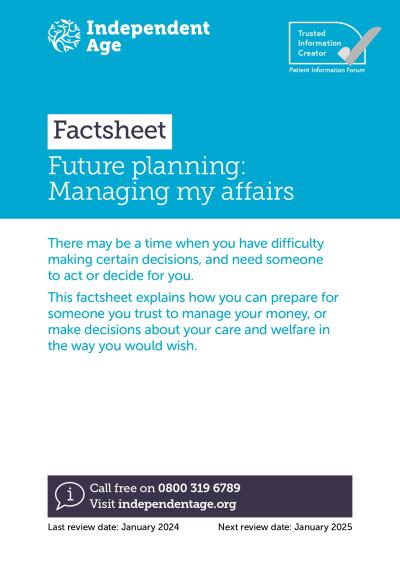Related publications

Future planning: Managing my affairs

There may come a time when your relative or friend needs someone to make decisions on their behalf. Sometimes it’s temporary, because of illness or a hospital stay, but it may be long term if they have late-stage dementia or a serious accident, for example. Loss of mental capacity can happen unexpectedly, so it’s a good idea for everyone to have arrangements in place, such as a power of attorney or an advance decision.
It can be hard for anyone to think about a time when they might lose mental capacity and are no longer able to understand and make certain important decisions about their life. Being diagnosed with a condition such as dementia can make this a very real prospect. Talking about who might make decisions on their behalf can be challenging because:
There are benefits to discussing it early on and putting arrangements in place. Many people feel relieved once it is done because they know their wishes have been documented, there is clarity for the future and they have taken control.
Losing mental capacity isn’t just an issue that affects older people. It can be a sensitive situation to imagine, especially if you and your relative or friend are healthy, but anyone can lose capacity at any time. So we should all be talking about who we would want to make decisions on our behalf if the need arose.
You might be nervous about putting your relative or friend on the spot, or unsure of how to begin the discussion. You can introduce the subject in different ways:
This might be a topic that they've not thought about before. You can encourage them to start thinking about what they would want if the situation arose:
If your relative or friend wants to give someone authority to make decisions for them should the need arise, there are different options depending on the type of decision. If they want someone to make decisions about their money or care in the future, they will need a power of attorney. In England and Wales, it's known as a lasting power of attorney (LPA).
There are two types:
A person's attorney will be given complete authority over their property and financial or health and welfare affairs, so you should encourage your relative or friend to think carefully about choosing someone they trust.
If your relative or friend doesn’t set up a power of attorney and then they lose capacity, you might have to go to the Court of Protection to get permission to act on their behalf. This can be a lengthy and expensive process.
If they want to refuse any specific treatments, they can also make an advance decision to refuse treatment, or an advance statement to say how they would like to be cared for. These will be used if they ever lose capacity to make the decision or communicate their wishes. An advance decision is legally binding.
As a first step, look at our webpages on:
If your relative or friend is struggling after being diagnosed with a long-term condition, support from a trained counsellor may be helpful, or they could get help from other support organisations.

To find out more about power of attorney, contact the Office of the Public Guardian in England and Wales, or the Office of the Public Guardian Scotland.
You can create an advanced decision or advance statement with the help of the online tool mydecisions.org.uk.
For more advice, see our guide Planning for the end of life.